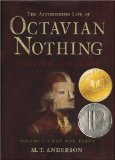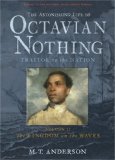
 The Pox Party by M.T. Anderson
The Pox Party by M.T. Anderson
“I do not believe they ever meant unkindness.”
So Octavian says of those to whom he was an experiment, to those who claimed he was chattel, to those who weighed his excrement daily and compared it to his intake.
It is perhaps this book’s most frightening truth that he is correct.
Octavian and his mother were sold into slavery in the 1760s, in Boston, to The Novanglian College of Lucidity. These men were rationalists, and sought to discover — once all of the niceties are removed — whether the Negro was inferior to the European. Octavian was taught “the arts and knowledge of the physical world… the strictest instruction in ethics… kindness, filial duty, piety, obedience, and humility,” Latin, Greek, the violin, and while learning these things, he was dressed in silk and lavished with luxuries.
Yet we immediately see the detached scientist in his caretakers, as Octavian describes experiments in which they timed the drowning of a dog, dropped alley-cats from high places to “judge the height from which cats no longer shatter,” and tried to teach a girl “deprived of reason and speech” the usage of verbs by beating her “to the point of gagging and swooning.”
And yet they never meant unkindness.
While Pox Party is a book of fiction, it is useful to remember (as Anderson calls us to at the end) that while the College of Lucidity is a fictional entity, the kind of experiments they conducted indeed took place, and the question of inferiority was one that was much discussed.
Octavian, with his mother, Mr. Gitney, and Dr. Trefusis, excelled. He became literate beyond their hopes and could play the violin as a virtuoso. Without a doubt, his education was better than the vast majority of children his age, white or black. But then the College’s benefactor dies and a new benefactor arrives, represented by Mr. Sharpe, who presupposes the inferiority of the Negro and demands that Octavian’s studies be changed…changed to ensure his failure.
As with all stories, once change is introduced, the stakes increase.
M.T. Anderson tells this story with a remarkably sure hand, using spot-on eighteenth century diction and grammar as much as he could without losing his intended audience — young adults. The majority of the story is told through the backward-looking eyes of Octavian himself, but Anderson also employs newspaper clippings and a variety of letters (most entertaining were the set from the soldier, Evidence Goring, to his sister and mother) to further authenticate the tale and ground it.
All of the characters are three-dimensional. The plot is handled with meticulous care, moving cautiously in the beginning, like an orchestral score, building with intensity to the moment of change, the crescendo which, not surprisingly, also occurs side-by-side with a telling of a part of the war.
Setting his story against the backdrop of the Revolutionary War proved brilliant, for the irony of slave-owners sending slaves not promised freedom to fight in their stead for the cause of liberty, can be lost on no one.
This is without question one of the most moving books I have read in some time. The character of Octavian is one of the most unique and fully realized I have ever encountered in young adult fiction.
That The Pox Party won the National Book Award should be no surprise.
![]() FanLit thanks Todd Burger for this guest review. Todd is a businessman from Chicago. He fell in love with fantasy after watching The Wizard of Oz in second grade. The next day, he scurried to the library but found the book already checked out. However, the librarian lifted his spirits by showing him thirteen more Oz books by L. Frank Baum. In third grade, his mother imposed a ban on “those Oz books,” which had become an obsession. Forced to diversify, he tried to check out Huckleberry Finn, but his teacher opposed the idea. When he presented her with a Dr. Seuss book for approval, he quickly found himself cleaning erasers for being “full of too much sass.” Once, he charmed a substitute teacher into approving Huck Finn, and when his duplicity was discovered, he came to know eraser dust intimately. Soon, Todd started reading everything he could find.
FanLit thanks Todd Burger for this guest review. Todd is a businessman from Chicago. He fell in love with fantasy after watching The Wizard of Oz in second grade. The next day, he scurried to the library but found the book already checked out. However, the librarian lifted his spirits by showing him thirteen more Oz books by L. Frank Baum. In third grade, his mother imposed a ban on “those Oz books,” which had become an obsession. Forced to diversify, he tried to check out Huckleberry Finn, but his teacher opposed the idea. When he presented her with a Dr. Seuss book for approval, he quickly found himself cleaning erasers for being “full of too much sass.” Once, he charmed a substitute teacher into approving Huck Finn, and when his duplicity was discovered, he came to know eraser dust intimately. Soon, Todd started reading everything he could find.




As someone who's waited for this book longer than most people seeing this have been alive, it was good reading…
What a strange review! I found this because it's linked on the Wikipedia article for Dragon Wing. Someone who claims…
[…] Ursula K. Le Guin’s The Left Hand of Darkness is a groundbreaking novel that explores themes of gender and…
[…] (Fantasy Literature): A Night in the Lonesome October (1993) is narrated by the aptly-named Snuff, a dog who is…
I re-read 'The King of Ys' abpout every ten years. The prose is luminous, and the story absorbing. I commend…